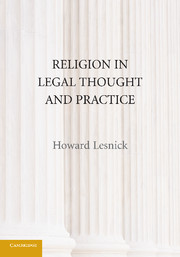Book contents
- Frontmatter
- Contents
- Preface
- I INTRODUCTIONS
- II MORAL OBLIGATION AND RELIGIOUS BELIEF
- III RELIGION AND SOME CONTEMPORARY MORAL CONTROVERSIES
- IV THE INTERACTION BETWEEN RELIGION AND THE SECULAR LAW
- 12 “Render unto Caesar”: Religion and (Dis)Obedience to Law
- 13 Religiously Grounded Morality and the Reach of Public Law
- 14 Capital Punishment
- 15 War
- V RESPONDING TO RELIGIOUS DIVERSITY
- VI RELIGIOUSLY GROUNDED MORAL DECISION-MAKING IN PROFESSIONAL LIFE
- Copyright Permission Acknowledgments
- Authors of Works Reprinted
- Scriptural Passages
- Index
12 - “Render unto Caesar”: Religion and (Dis)Obedience to Law
Published online by Cambridge University Press: 05 June 2012
- Frontmatter
- Contents
- Preface
- I INTRODUCTIONS
- II MORAL OBLIGATION AND RELIGIOUS BELIEF
- III RELIGION AND SOME CONTEMPORARY MORAL CONTROVERSIES
- IV THE INTERACTION BETWEEN RELIGION AND THE SECULAR LAW
- 12 “Render unto Caesar”: Religion and (Dis)Obedience to Law
- 13 Religiously Grounded Morality and the Reach of Public Law
- 14 Capital Punishment
- 15 War
- V RESPONDING TO RELIGIOUS DIVERSITY
- VI RELIGIOUSLY GROUNDED MORAL DECISION-MAKING IN PROFESSIONAL LIFE
- Copyright Permission Acknowledgments
- Authors of Works Reprinted
- Scriptural Passages
- Index
Summary
Let every person be subject to the governing authorities; for there is no power but of God, and the powers that be are ordained by God. Therefore whoever resists authority resists what God has appointed. … Therefore one must be subject, not only because of wrath but because of conscience.
Romans 13:1–2, 5.“Teacher, we know that you are sincere, and teach the way of God in accordance with truth, and show deference to no one: for you do not regard people with partiality. Tell us then, what you think. Is it lawful to pay taxes to Caesar or not?” But Jesus, aware of their malice, said, “Why are you putting me to the test, you hypocrites? Show me the coin used for the tax.” And they brought him a denarius. Then he said to them, “Whose head is this, and whose title?” They answered, “Caesar's.” Then he said to them, “Render therefore unto Caesar the things which are Caesar's; and unto God the things that are God's.”
Matthew 22:16–21.One way of putting the question with which this chapter is primarily concerned is whether, and if so how, the message of these two passages can be reconciled in one's life.
The moral duty to obey the secular law is an embedded aspect of both the Christian and the Jewish traditions; the extent, in those traditions, to which that duty should control action is a matter that cannot be readily summarized and will not be addressed here. This chapter will rather focus on examples of expressions of a religiously grounded duty to disobey in certain cases.
- Type
- Chapter
- Information
- Religion in Legal Thought and Practice , pp. 357 - 411Publisher: Cambridge University PressPrint publication year: 2010



